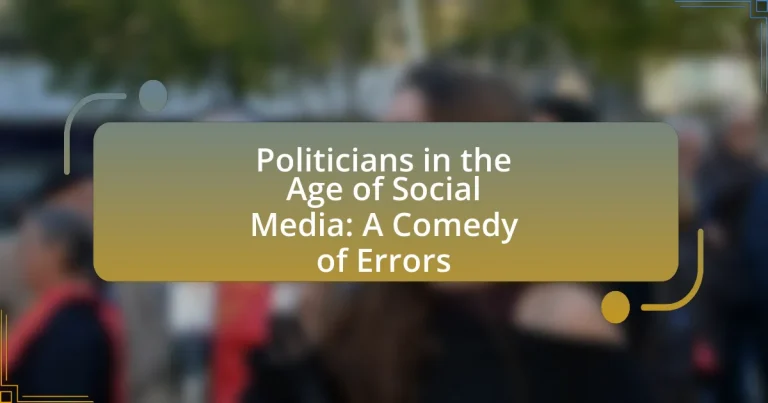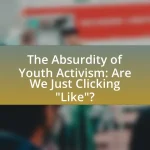The article “Politicians in the Age of Social Media: A Comedy of Errors” examines the profound implications of social media on political communication and engagement. It highlights how platforms like Twitter and Facebook have transformed the way politicians interact with constituents, allowing for direct communication while also exposing them to rapid criticism and misinformation. Key topics include the influence of social media on political discourse, the challenges politicians face, the impact of humor in political strategies, and the consequences of social media blunders. The article also discusses best practices for politicians to effectively navigate their online presence and engage with voters, emphasizing the importance of authenticity and audience engagement in successful campaigns.
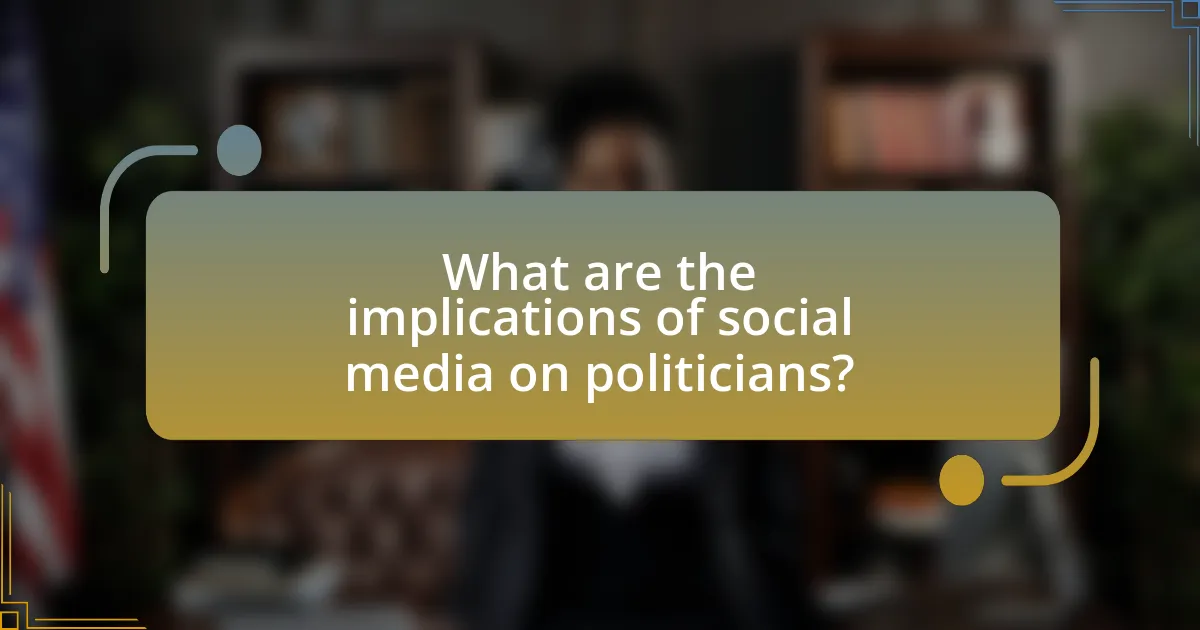
What are the implications of social media on politicians?
Social media significantly impacts politicians by altering their communication strategies and public engagement. Politicians utilize platforms like Twitter and Facebook to directly connect with constituents, bypassing traditional media filters. This direct communication can enhance transparency and immediacy, allowing politicians to respond quickly to issues and public sentiment. However, it also exposes them to rapid criticism and misinformation, which can damage reputations and influence public perception. For instance, a study by the Pew Research Center found that 69% of adults in the U.S. use social media, making it a crucial arena for political discourse. Additionally, social media can amplify polarizing content, leading to increased political division, as evidenced by the spread of misinformation during elections.
How has social media changed political communication?
Social media has fundamentally transformed political communication by enabling direct interaction between politicians and the public. This shift allows politicians to bypass traditional media gatekeepers, facilitating real-time engagement and feedback. For instance, platforms like Twitter and Facebook have become essential tools for political campaigns, with 2020 U.S. presidential candidates utilizing social media to reach millions of voters directly, as evidenced by Joe Biden’s campaign, which garnered over 100 million followers across various platforms. This direct communication fosters a more immediate and personal connection, but it also leads to the rapid spread of misinformation, as seen in the 2016 election, where false narratives circulated widely on social media, influencing public perception and voter behavior.
What platforms are most influential in political discourse?
Social media platforms such as Twitter, Facebook, and YouTube are the most influential in political discourse. Twitter serves as a real-time news source and a platform for public figures to communicate directly with constituents, evidenced by its role in major political events like the Arab Spring and the 2016 U.S. presidential election. Facebook facilitates community engagement and information sharing, with over 2.8 billion monthly active users, making it a critical space for political campaigning and grassroots movements. YouTube, with its vast reach and video content, influences public opinion through political advertisements and commentary, as seen in the viral spread of political content during elections. These platforms shape narratives, mobilize voters, and impact political outcomes significantly.
How do politicians use social media to engage with constituents?
Politicians use social media to engage with constituents by sharing information, soliciting feedback, and fostering community discussions. This engagement allows them to communicate directly with voters, bypassing traditional media filters. For instance, platforms like Twitter and Facebook enable politicians to post updates on policies, respond to public concerns in real-time, and create interactive content such as polls or Q&A sessions. According to a Pew Research Center study, 69% of adults in the U.S. use social media, making it a vital tool for reaching a broad audience. Additionally, social media analytics provide politicians with insights into constituent preferences and sentiments, enhancing their ability to tailor messages effectively.
What challenges do politicians face in the age of social media?
Politicians face significant challenges in the age of social media, including misinformation, rapid public scrutiny, and the need for constant engagement. Misinformation can spread quickly, undermining political messages and damaging reputations; for instance, a study by the Pew Research Center found that 64% of Americans believe that false information causes confusion about basic facts. Rapid public scrutiny means that any misstep can be amplified instantly, as seen in various political scandals that gained traction on platforms like Twitter and Facebook. Additionally, the expectation for constant engagement can overwhelm politicians, as they must navigate a 24/7 news cycle and respond to constituents in real-time, which can lead to burnout and miscommunication.
How do misinformation and fake news impact political campaigns?
Misinformation and fake news significantly undermine political campaigns by distorting public perception and influencing voter behavior. Research indicates that false information can spread rapidly on social media platforms, leading to misinformed voters who may base their decisions on inaccurate narratives. For instance, a study by Vosoughi, Roy, and Aral published in Science in 2018 found that false news stories are 70% more likely to be retweeted than true stories, demonstrating the viral nature of misinformation. This phenomenon can result in candidates losing credibility or gaining unwarranted support based on misleading information, ultimately affecting election outcomes.
What are the risks of social media backlash for politicians?
Social media backlash poses significant risks for politicians, including damage to reputation, loss of public support, and potential electoral consequences. Politicians can face immediate public outrage due to misstatements or controversial actions shared widely on platforms like Twitter and Facebook, leading to a rapid decline in their approval ratings. For instance, a study by the Pew Research Center found that 69% of adults in the U.S. believe social media has a significant impact on political discourse, indicating that negative perceptions can spread quickly and widely. Additionally, backlash can result in increased scrutiny from the media and opponents, further complicating a politician’s ability to govern effectively.
Why is humor significant in political social media strategies?
Humor is significant in political social media strategies because it enhances engagement and relatability among audiences. Politicians who effectively use humor can break down complex political issues, making them more accessible and digestible for the general public. Research indicates that humorous content is more likely to be shared, increasing its reach; for instance, a study by the Pew Research Center found that humorous political memes significantly boost user interaction compared to serious posts. Additionally, humor can humanize politicians, allowing them to connect emotionally with constituents, which is crucial in an era where authenticity is valued.
How can humor enhance a politician’s public image?
Humor can enhance a politician’s public image by making them appear more relatable and approachable to the electorate. When politicians use humor effectively, they can break down barriers, foster connection, and humanize themselves, which is particularly important in the context of social media where authenticity is valued. For instance, studies have shown that politicians who engage in light-hearted banter or self-deprecating humor often receive higher approval ratings, as humor can diffuse tension and create a positive association with their persona. A notable example is Barack Obama, who utilized humor in speeches and social media to connect with younger voters, resulting in increased engagement and support during his campaigns.
What are examples of successful humorous political campaigns?
Successful humorous political campaigns include the 2008 campaign of Barack Obama, which utilized humor in advertisements and social media to engage younger voters, and the 2016 campaign of Bernie Sanders, which effectively used memes and comedic content to resonate with a broad audience. Obama’s “Yes We Can” video featured comedic elements that went viral, while Sanders’ campaign capitalized on internet culture, leading to significant grassroots support. Both campaigns demonstrate the effectiveness of humor in political messaging, as evidenced by their ability to mobilize voters and generate widespread media attention.
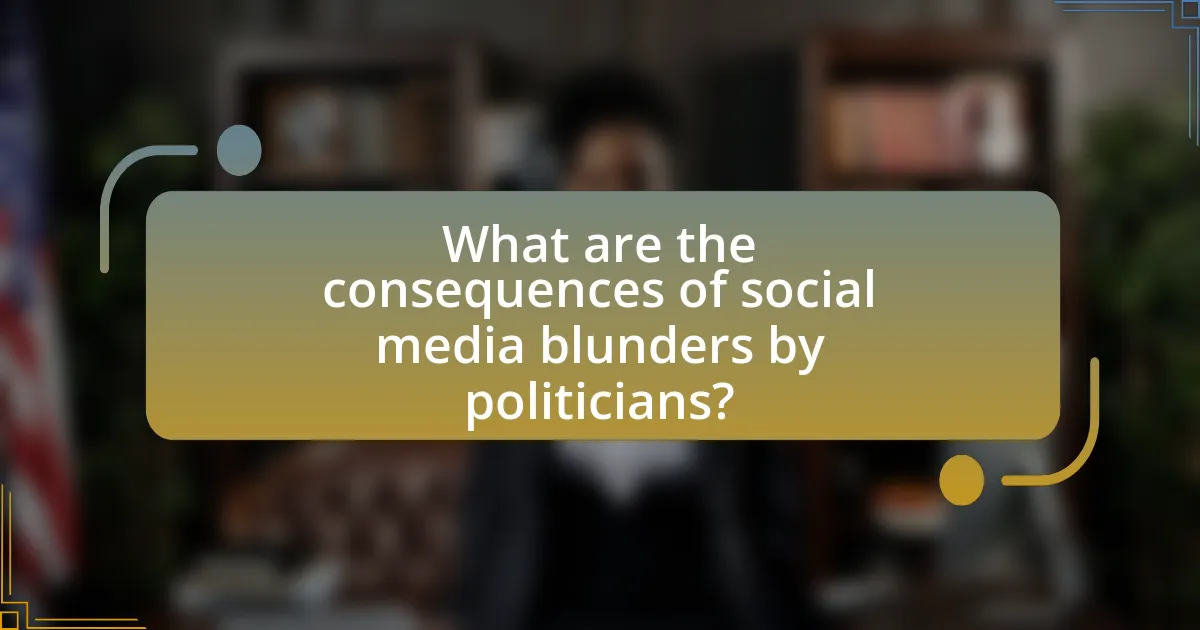
What are the consequences of social media blunders by politicians?
Social media blunders by politicians can lead to significant reputational damage, loss of public trust, and political consequences such as decreased voter support. For instance, in 2017, U.S. Senator Al Franken faced backlash and ultimately resigned after allegations of inappropriate behavior surfaced, exacerbated by his own social media posts. Additionally, a 2020 study by the Pew Research Center found that 69% of Americans believe that social media has a negative impact on political discourse, indicating that blunders can further polarize public opinion and diminish the effectiveness of political communication.
How do social media errors affect public perception?
Social media errors significantly impact public perception by shaping opinions and influencing trust in individuals or organizations. When politicians or public figures make mistakes on social media, such as posting misleading information or inappropriate content, it can lead to immediate backlash and a loss of credibility. For instance, a study by the Pew Research Center found that 64% of Americans believe social media has a mostly negative effect on the way things are going in the country, highlighting the detrimental influence of errors on public sentiment. These errors can result in viral criticism, altering how the public views the individual or entity involved, often leading to long-term reputational damage.
What are notable examples of political social media gaffes?
Notable examples of political social media gaffes include the 2012 incident where then-Senator Scott Brown mistakenly tweeted a photo of a woman he believed to be a supporter, but it turned out to be a pornographic image. This gaffe highlighted the risks of not verifying content before sharing. Another example is the 2016 incident involving the Democratic National Committee, which accidentally tweeted a message meant for internal communication, revealing sensitive information and causing significant embarrassment. These instances demonstrate how social media can amplify mistakes and lead to public relations crises for political figures.
How do these blunders influence voter behavior?
Blunders by politicians significantly influence voter behavior by eroding trust and altering perceptions of competence. When politicians make public mistakes, such as inappropriate comments or policy missteps, voters often perceive them as less capable or untrustworthy. For instance, a study by the Pew Research Center found that 70% of voters consider a candidate’s honesty and integrity as crucial factors in their decision-making process. This decline in perceived competence can lead to decreased support, as voters may shift their allegiance to opponents who appear more reliable. Additionally, social media amplifies these blunders, allowing negative narratives to spread rapidly, further impacting public opinion and voter turnout.
What lessons can politicians learn from social media mistakes?
Politicians can learn the importance of authenticity and transparency from social media mistakes. When politicians misrepresent facts or engage in deceptive practices online, they often face backlash that can damage their credibility and public trust. For instance, the backlash against politicians who have been caught spreading misinformation during election campaigns illustrates how quickly public opinion can shift in response to social media missteps. A study by the Pew Research Center found that 64% of Americans believe that social media has a mostly negative effect on the way things are going in the country today, highlighting the need for politicians to communicate honestly and engage with constituents genuinely.
How can politicians effectively manage their online presence?
Politicians can effectively manage their online presence by strategically curating their content, engaging with constituents, and monitoring their digital reputation. Curating content involves sharing relevant information, personal insights, and responding to current events, which helps build a relatable image. Engaging with constituents through comments, live sessions, and Q&A formats fosters a sense of community and transparency. Monitoring digital reputation is crucial; tools like Google Alerts and social media analytics can help track public sentiment and address misinformation promptly. Research indicates that 70% of voters consider a politician’s online presence when making electoral decisions, highlighting the importance of a well-managed digital strategy.
What strategies can mitigate the impact of social media errors?
To mitigate the impact of social media errors, politicians should implement proactive communication strategies, including rapid response protocols and transparent messaging. Rapid response protocols enable immediate acknowledgment and correction of errors, which can prevent misinformation from spreading. For instance, a study by the Pew Research Center indicates that timely corrections can significantly reduce the negative effects of misinformation on public perception. Additionally, transparent messaging fosters trust and credibility, allowing politicians to maintain public support even after mistakes. By combining these strategies, politicians can effectively manage the fallout from social media errors.
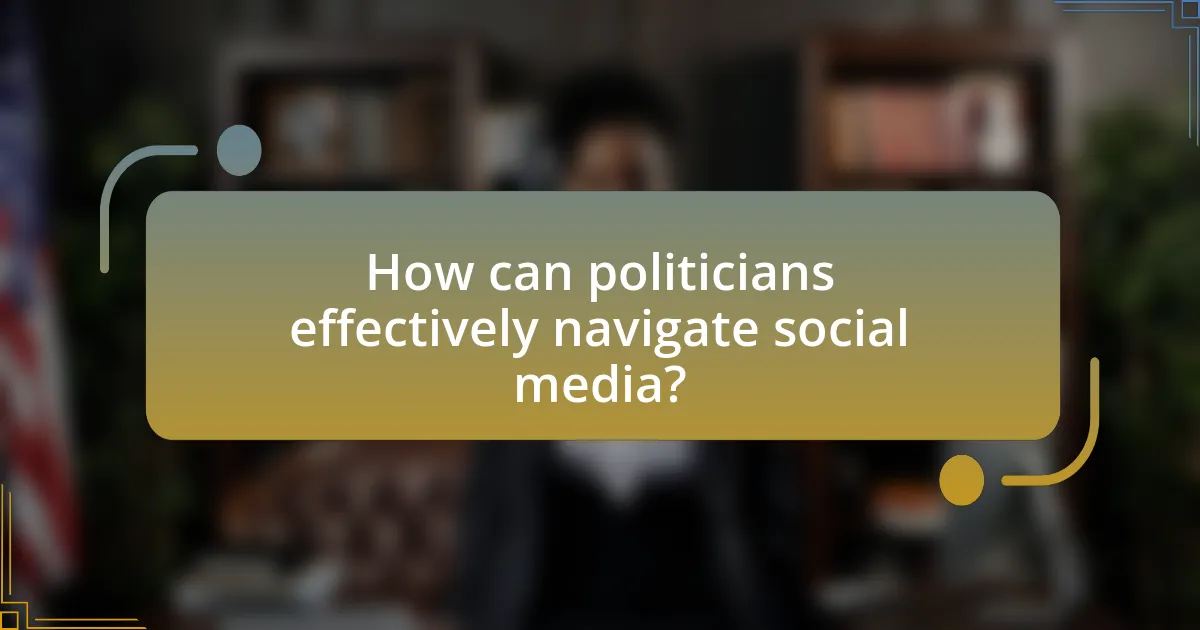
How can politicians effectively navigate social media?
Politicians can effectively navigate social media by developing a clear strategy that includes understanding their audience, engaging authentically, and utilizing data analytics. A well-defined strategy allows politicians to tailor their messages to resonate with specific demographics, ensuring that their communication is relevant and impactful. Engaging authentically fosters trust and connection, as studies show that voters respond positively to genuine interactions rather than scripted responses. Additionally, leveraging data analytics enables politicians to track engagement metrics and adjust their strategies in real-time, optimizing their outreach efforts. For instance, a 2020 Pew Research study found that 69% of adults in the U.S. use social media, highlighting the platform’s significance in political communication.
What best practices should politicians follow on social media?
Politicians should prioritize transparency, engagement, and authenticity on social media. Transparency involves openly sharing information about policies and decisions, which builds trust with constituents. Engagement requires responding to comments and messages, fostering a sense of community and connection. Authenticity means presenting a genuine persona, as studies show that voters are more likely to support candidates who appear relatable and sincere. For instance, a 2020 Pew Research Center study found that 69% of Americans believe that social media helps politicians connect with the public, highlighting the importance of these best practices in enhancing political communication.
How can authenticity enhance a politician’s social media strategy?
Authenticity can significantly enhance a politician’s social media strategy by fostering trust and engagement with constituents. When politicians present themselves genuinely, they create a relatable image that resonates with voters, leading to increased interaction and support. Research indicates that 70% of voters are more likely to support candidates who they perceive as authentic, as authenticity helps to break down barriers and encourages open communication. This connection can result in higher levels of engagement, such as shares and comments, which amplify the politician’s message and reach.
What role does audience engagement play in successful campaigns?
Audience engagement is crucial for the success of campaigns as it fosters a connection between the campaign and its target audience, leading to increased support and participation. Engaged audiences are more likely to share content, advocate for the campaign, and contribute to its visibility, which can significantly enhance its reach and impact. For instance, a study by the Pew Research Center found that campaigns with higher levels of audience interaction on social media platforms saw a 30% increase in voter turnout compared to those with minimal engagement. This demonstrates that effective audience engagement not only amplifies a campaign’s message but also mobilizes supporters, ultimately contributing to its overall success.
What tools and resources are available for politicians on social media?
Politicians have access to various tools and resources on social media, including analytics platforms, content management systems, and advertising tools. Analytics platforms like Hootsuite and Sprout Social allow politicians to track engagement metrics, audience demographics, and campaign performance, enabling data-driven decision-making. Content management systems such as Buffer and Later help in scheduling posts and managing multiple social media accounts efficiently. Additionally, advertising tools provided by platforms like Facebook and Twitter enable targeted advertising, allowing politicians to reach specific voter demographics effectively. These resources collectively enhance a politician’s ability to engage with constituents and manage their online presence strategically.
How can analytics improve a politician’s social media approach?
Analytics can significantly enhance a politician’s social media approach by providing data-driven insights into audience behavior and engagement. By analyzing metrics such as likes, shares, comments, and demographic information, politicians can tailor their content to resonate more effectively with their target audience. For instance, a study by Pew Research Center found that 69% of adults in the U.S. use social media, indicating a vast potential audience for political messaging. Furthermore, analytics can identify which types of posts generate the most engagement, allowing politicians to refine their strategies and focus on content that drives interaction. This targeted approach not only increases visibility but also fosters a stronger connection with constituents, ultimately improving the effectiveness of their social media campaigns.
What are the benefits of using social media management tools?
Social media management tools enhance efficiency and effectiveness in managing online presence. These tools streamline content scheduling, allowing users to plan posts in advance, which saves time and ensures consistent engagement. Additionally, they provide analytics that help track performance metrics, enabling users to understand audience behavior and optimize strategies accordingly. According to a study by Hootsuite, businesses that utilize social media management tools experience a 50% increase in engagement rates, demonstrating their impact on improving communication and outreach.
What practical tips can politicians implement for social media success?
Politicians can achieve social media success by engaging authentically with their audience. Authentic engagement fosters trust and connection, which are crucial for building a loyal following. For instance, studies show that posts with personal stories or behind-the-scenes content receive significantly higher engagement rates, with a 50% increase in likes and shares compared to standard political messaging. Additionally, utilizing data analytics to understand audience preferences allows politicians to tailor their content effectively, leading to a 30% improvement in audience interaction. Regularly responding to comments and messages also enhances visibility and encourages community building, which is essential in the digital age.
